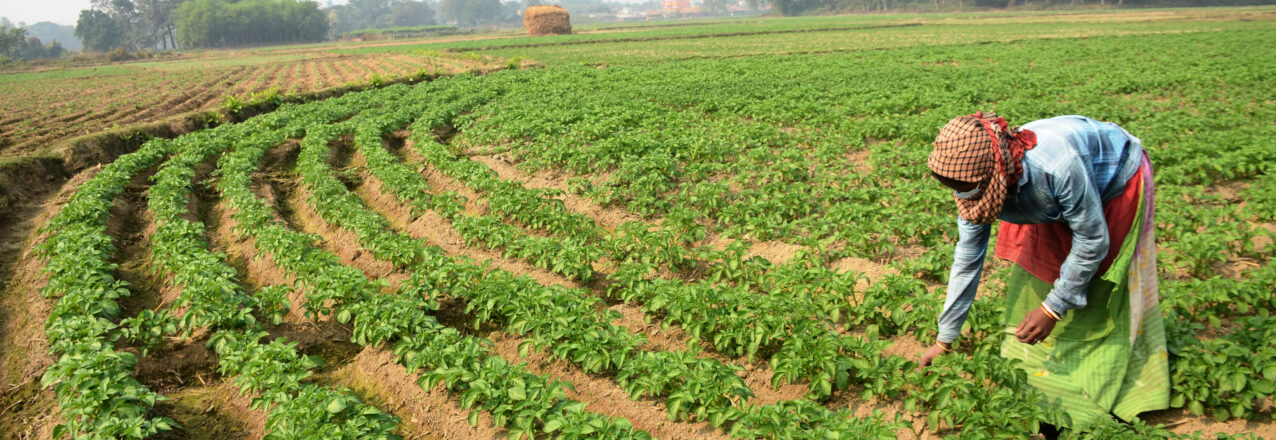Before becoming a community agronomist, Anamika Ghosh had never stepped foot on a farm. Like most women in her community, her family was involved in farming, but her role was confined to cutting and preparing seed potatoes at home. “I had no knowledge about farming,” she said. “I supported my husband but was not a farmer myself.”
Anamika’s story is typical of many women. Although women make up over 50 percent of the agricultural labor force in many countries, their roles tend to be overlooked, undervalued, and underpaid. Land ownership is often required to participate in contract farming, and as women continue to face barriers to owning land, they remain underrepresented in global food and agricultural value chains.
Closing the gender gap in agriculture could increase global GDP by US 1 trillion and reduce global food security for 45 million people. The private sector is a key partner in this effort, as more companies realize that investing in women’s empowerment has direct impacts on their bottom line, increasing productivity, expanding the supply base, meeting international standards, and enhancing company reputation.
Under the Integrated Land and Resource Governance (ILRG) program, USAID worked with private sector partners to empower women and expand their access to agricultural supply chains. In India, USAID and PepsiCo partnered to empower women in PepsiCo’s potato supply chain by increasing their access to critical productive resources like land and agronomy knowledge. Over 1,800 women received agronomy and sustainable farming practices training for the first time and over 800 farmers (65 percent women) received land literacy training. In Ghana, USAID partnered with Ecom Agroindustrial Corp. (ECOM), a global commodity trading and processing company, to increase gender-responsiveness in ECOM’s internal policies and practices and to pilot targeted women’s empowerment activities in cocoa communities. ECOM reached over 2,600 farmers (55 percent women) to engage in dialogues about harmful gender norms around control of productive resources and gender-based violence. To increase women’s economic security, the company supported alternative livelihoods for women in 37 communities.
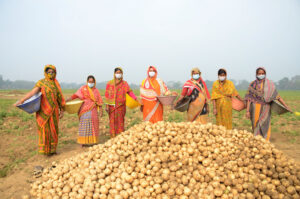
WOMEN GAINED CONFIDENCE AND DECISION-MAKING POWER
Both partnerships achieved notable results in women’s empowerment and in the companies’ tangible and intangible business metrics. In both countries, women began to be recognized as farmers rather than “farmers’ wives” – a shift that opens the door to new opportunities. In India, access to agronomy knowledge increased women’s confidence, leading to improved social mobility, financial autonomy, and greater say in household decisions over the use of land and income. In Ghana, men and women farmers started to change their beliefs and behaviors around gender roles and responsibilities, with men recognizing the importance of women owning land and equitable sharing of household tasks and household decision-making. According to cocoa farmer Emmanuel Oboery, rethinking the division of labor in his household led to more collaboration and increased productivity, “Before, with only me working in the farm, I would make two or three bags per season. Now working together we can make five or six bags. Before me and my wife were each on their own separate path, but we are one now.”
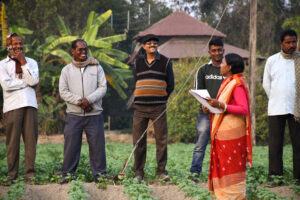
WOMEN’S EMPOWERMENT IS GOOD FOR BUSINESS
Once women had improved access to productive resources and harmful gender norms started to shift, there were improvements in company productivity, supply base retention, and brand image and loyalty. In India, families of women who received agronomy training had better gross and net yields – 84 percent of women farmers trained reported an increase in their farm yield compared to the previous year and 76 percent reported a decrease in rejection rates. PepsiCo and ECOM staff reported that women in project communities are joining the supply chain at a higher rate than men, supporting greater stability and growth of the supply base. Farmer loyalty is closely linked to better company reputation. As farmers see companies making intentional efforts to engage women farmers and the benefits that come with it, they feel more inclined to start or continue to work with the company.
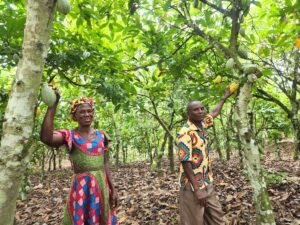
THE PATH FORWARD
Private sector engagement can provide opportunities for greater sustainability and scalability of USAID investments. The USAID-PepsiCo pilot spurred a larger five-year Global Development Alliance across five countries to empower women in different supply chains. This will help PepsiCo meet its commitment to improve the livelihoods of 250,000 people in its supply chain by 2030. PepsiCo staff are now leading training with women farmers in new communities across West Bengal, using gender-responsive tools and materials developed under the partnership. In Ghana, ECOM has developed a five year gender strategy, which includes gender equality metrics the company will report against internally at the country level, and recruited dedicated staff to implement it and continue to roll out gender norms training to farmers in new communities and regions.
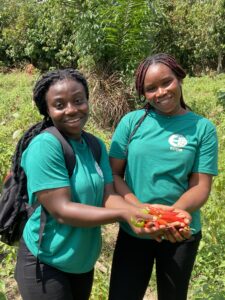
These partnerships demonstrate that investing in women is not only critical for USAID’s development goals related to food security, economic growth, and resilience, but it is also good for business. Anamika, the once shy woman who thought that cutting potato seeds was not important, now feels confident to lead the family farming business and train other women. “Now I know I am a farmer. I have technical knowledge and I am encouraging others in my community.” When they can access the productive resources needed to thrive, women farmers like Anamika have the potential to transform global food security and supply chains, feeding their families, their communities, and the world.


